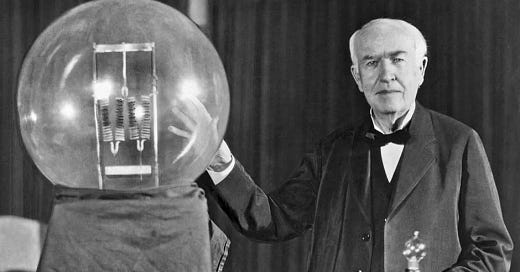Anti-Trust vs. Tech
John D. Rockefeller provides a lesson, but not the one you think.
by Rod D. Martin
September 3, 2013
It's pretty stupid.
Anti-trust law exists because capitalism is all about a level playing field. We want people to have the chance to succeed. We do not want people to do things that make it impossible for other people to succeed. We can debate whether or not anti-trust law is the best way to achieve that. But that's why it exists.
But when it comes to technology, monopoly has no meaning, at least not in the traditional sense. If John D. Rockefeller scooped up 90% of the world's oil production, refining, transport and distribution capacity, his doing so created an enormous barrier to entry for others who wanted to compete in his business. Not necessarily an insuperable one, but certainly an extremely difficult one, one adjudged by Rockefeller's contemporaries to be unjust and, ultimately, unlawful.
Yet even there, it's worth remembering that Rockefeller's primary business wasn't oil, but light: specifically, the kerosene that fueled kerosene lamps. And that business was disrupted, from a completely unexpected direction: Thomas Edison and J.P. Morgan's development of electric lights. Oil found new purposes, and so did electricity, but who uses kerosene today?
It is ever thus with technology. As the Wall Street Journal points out today in recounting the last decade's history of Microsoft and Nokia (the former of which announced today that it is purchasing the latter for just over 2% of its 2000 valuation), the only real barrier to entry in technology is imagination.
At the time Nokia was peaking, Microsoft was also considered so dominant that regulators around the world argued that its position was all but unassailable. They filed antitrust lawsuits and even tried to break it up, a la AT&T in the 1980s. The claim at the time was that the "network effects"—or increasing economic returns—created by the Windows operating system meant that Microsoft would dominate the future of computing for decades to come. Every competitor would be devoured.
Insanity. I said so then. Everyone would say so today.
Yet the Justice Department never learns. Government rarely does. Android is already making Samsung the world's largest handset maker, and the number of competitors for the Apple TV set top box I'm addicted to seems to multiply by the day. Nevertheless,
In the latest evidence, the Department of Justice told a federal court in August that it wants a government overseer for Apple's iTunes and App Stores in order to prevent the company from abusing the alleged network effects and "lock-in" created by Apple's tech ecosystem. Never mind competition from Amazon, Google and others.
And this against a company that couldn't be more politically correct, and even sports Al Gore on its board. Imagine being Apple while Republican.
This is why government is so ill-suited to manage large chunks of the economy: it either does a really bad job (e.g., the Post Office, or veterans hospitals), or it just doesn't know what the heck it's doing. Nowhere is this worse than in technology, where a bureaucracy designed around the quill pen tries to anticipate innovation and pick winners in a field that can literally completely change in a day.
Read the Journal article -- "They Once Were Giants: Microsoft and Nokia ruled the tech world. Then they didn't." -- and learn.




